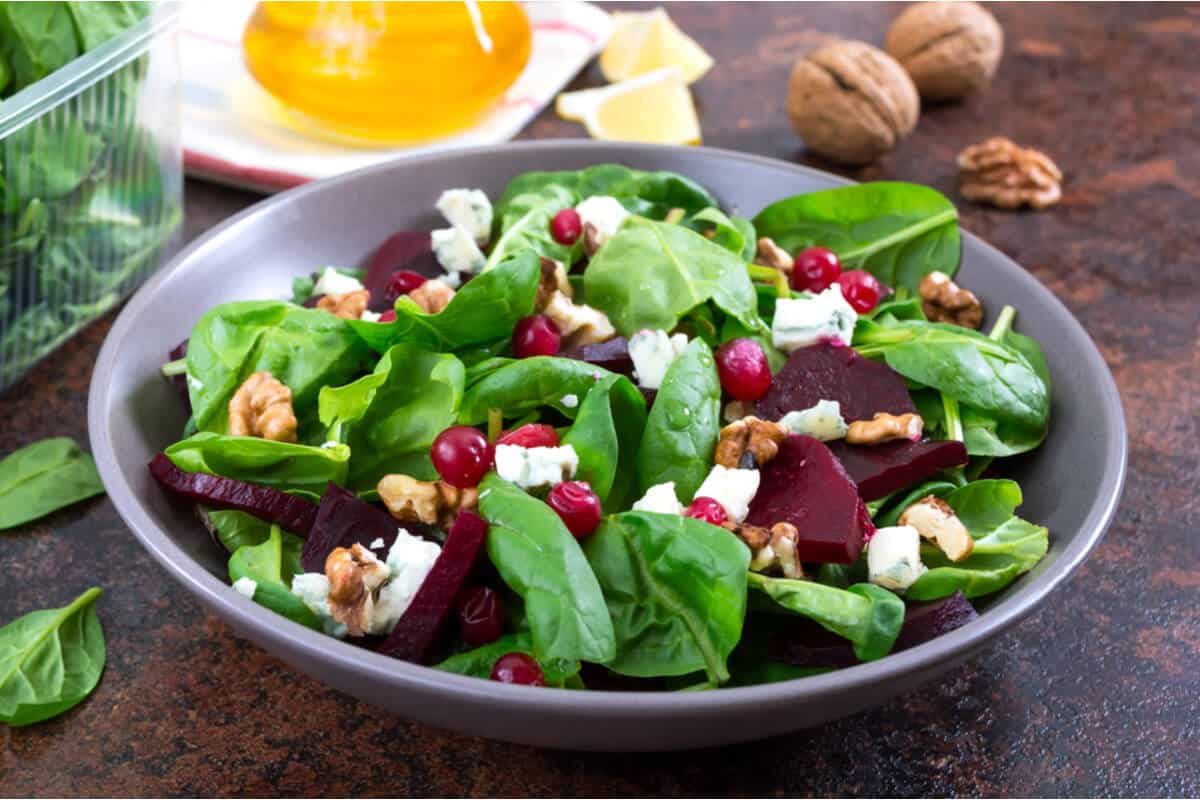What is oxalate?
Oxalate (also known as oxalic acid) is a substance found in plant foods, including fruits, vegetables, nuts, and grains. (4) Our bodies also produce oxalate when breaking down certain nutrients, including vitamin C. (2) Oxalate passes through the digestive system with other waste products. In the intestines, it can bind with calcium to form calcium oxalate, which allows it to be excreted through the stool. The remaining oxalate passes through the kidneys and is excreted from the body through the urine. (1)
Your practitioner may suggest a urine oxalate test to determine whether a low-oxalate diet is right for you.
What are kidney stones, and how do they form?
If oxalate and calcium make it through the digestive system into the kidneys and bond there, they can form calcium oxalate crystals in the urine. If these crystals stick together, they can form a larger mass—a kidney stone.Calcium oxalate kidney stones are the most common type of kidney stone, but they’re just one of several types. Other types include:
- Calcium phosphate stones
- Struvite stones, resulting from a urinary tract infection
- Uric acid stones, resulting from genetic factors, chronic diarrhea, diabetes, or a high-protein diet
- Cystine stones, which occur in people with a hereditary disorder that causes too much of the amino acid cysteine to be excreted by the kidneys (1)
How to know if you should follow the low-oxalate diet
The first thing you’ll need to know when deciding whether the low-oxalate diet is right for you is what type of kidney stones you have. You can find this out by collecting a kidney stone for analysis.To collect a kidney stone, you’ll need to filter all your urine through a strainer and look carefully for particles. Some kidney stones are as small as a grain of sand, so they can be easy to mix. Gather whatever stones you find and place them in a clean container without any liquid or wrapping. Bring the container to your healthcare provider or, if directed, a laboratory. (3)
If your kidney stone is the calcium oxalate type, that still doesn’t necessarily mean a low-oxalate diet is necessary. Your healthcare provider may suggest a urine oxalate test that requires you to collect urine each time you use the bathroom over the course of 24 hours.
Why do some people excrete more oxalate in their urine than others? There are a few possible reasons, including:
- They may not produce enough of the enzyme in the digestive tract that breaks down oxalate.
- They may simply eat too many high-oxalate foods for their digestive system to handle.
- They may have too much fat in their diet.
- They may consume too little calcium or not consume it at the same time they consume high-oxalate foods. (5)(7)
An integrative health expert can help you determine whether you have high levels of oxalate in your urine, and if so, whether the low-oxalate diet is the right course of action. Now, let’s look at what the low-oxalate diet entails.
What is the low-oxalate diet?
As a means of reducing the amount of oxalate that ends up in your urine, the low-oxalate diet involves reducing the amount of high-oxalate foods you eat and eating to change the way your body handles oxalate.To reduce the amount of oxalate you consume, try to avoid or limit the following foods.
High-oxalate food list
If you’re on the low-oxalate diet, avoid these foods:- Spinach
- Chard
- Rhubarb
- Star fruit (4)
Moderately high–oxalate food list
Limit these foods if you’re on the low-oxalate diet:- Potatoes
- Chocolate
- Nuts
- Beets
- Bran (4)

Avoid or limit high-oxalate foods such as spinach, beets, and nuts while on the low-oxalate diet.
Calcium and the low-oxalate diet
Another important consideration when aiming to reduce oxalate excretion is calcium intake. Since oxalate bonds with calcium and the resulting calcium oxalate can be excreted in the stool if the bond happens before the oxalate reaches the kidneys, you can counter the effects of high-oxalate foods by pairing them with some calcium-rich foods. Aim to ingest 300 to 400 mg of calcium with each meal. (4)The obvious go-to when we think about calcium is dairy. One cup of milk contains 300 mg of calcium, making it a quick and easy way to get the recommended amount of calcium per meal. (6) Calcium is also found in non-dairy sources. The trick is to find ones that are high in calcium but low in oxalate and sodium, as sodium is another risk factor for kidney stones. (1) Calcium-fortified breads, cereals, and juices can be a good choice. (5) Leafy greens such as kale, mustard greens, and bok choy are high in calcium and low in oxalate, making them suitable plant-based options for the low-oxalate diet. (5)
Vitamin C and oxalate
Since the body produces oxalate when it breaks down vitamin C, people who are looking to lower their oxalate levels may want to keep an eye on how much vitamin C they consume. In one study of around 50,000 male healthcare professionals, those who consumed more than 218 mg a day of vitamin C in their diets had a 31% higher risk of developing kidney stones than those who consumed under 105 mg per day. (8)Vitamin C supplements might also be problematic for people at risk of developing calcium oxalate kidney stones. Several studies have found that people taking supplemental vitamin C excrete more oxalate and are at a higher risk of forming kidney stones than those who don’t. However, vitamin C is an important component of any diet, so be sure to work with a qualified integrative healthcare provider to make sure you’re meeting your nutritional needs without increasing your risk of kidney stones. (9)(10)(11)
The bottom line
There are many considerations when deciding whether the low-oxalate diet is right for you. You’ll need to understand what type of kidney stones you form, whether you have high levels of oxalate in your urine, and if so, whether there are non-dietary factors involved. For all these reasons, it’s recommended to work with your integrative healthcare provider to decide whether and how to implement the low-oxalate diet. This expert will be able to help you identify low-oxalate diet recipes to make sure you’re getting all the nutrients you need while taking measures to reduce the amount of oxalate in your urine—and your risk of kidney stones.- Alelign, T., & Petros, B. (2018). Kidney Stone Disease: An Update on Current Concepts. Advances in urology, 2018, 3068365.
- Knight, J., Madduma-Liyanage, K., Mobley, J. A., Assimos, D. G., & Holmes, R. P. (2016). Ascorbic acid intake and oxalate synthesis. Urolithiasis, 44(4), 289–297.
- Medline Plus. (2020). Kidney stone analysis. https://medlineplus.gov/lab-tests/kidney-stone-analysis/
- Mitchell, T., Kumar, P., Reddy, T., Wood, K. D., Knight, J., Assimos, D. G., & Holmes, R. P. (2019). Dietary oxalate and kidney stone formation. American Journal of Physiology-Renal Physiology, 316(3), F409–F413.
- National Institute of Diabetes and Digestive and Kidney Diseases. (2017). Eating, diet, & nutrition for kidney stones.
- National Institutes of Health. (2021). Calcium. https://ods.od.nih.gov/factsheets/Calcium-HealthProfessional/
- National Kidney Foundation. (2019). Calcium Oxalate Stones. https://www.kidney.org/atoz/content/calcium-oxalate-stone
- Taylor, E. N. (2004). Dietary factors and the risk of incident kidney stones in men: New insights after 14 years of follow-up. Journal of the American Society of Nephrology, 15(12), 3225–3232.
- Taylor, E. N., & Curhan, G. C. (2008). Determinants of 24-hour urinary oxalate excretion. Clinical Journal of the American Society of Nephrology, 3(5), 1453–1460.
- Thomas, L. D. K., Elinder, C.-G., Tiselius, H.-G., Wolk, A., & Åkesson, A. (2013). Ascorbic acid supplements and kidney stone incidence among men: A prospective study. JAMA Internal Medicine, 173(5), 386.
- Traxer, O., Huet, B., Poindexter, J., Pak, C. Y. C., & Pearle, M. S. (2003). Effect of ascorbic acid consumption on urinary stone risk factors. Journal of Urology, 170(2), 397–401.





